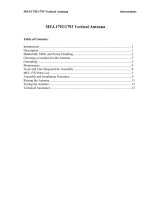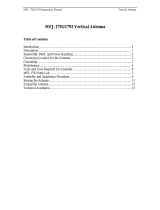Page is loading ...

MFJ
-
1740
INSTRUCTION MANUAL
Thank you for purchasing the MFJ-1740 1/4 wave antenna. The MFJ-
1740 is designed for use on 144 to 148 MHz. However, simple trimming
of the radiator and radials will yield a 1/4 wave antenna for 220 MHz
band, or a 1/4 wave antenna for 440 MHz band.
The MFJ-1740 is shipped partially assembled; you should have re-
ceived the following:
Item Quan. Description
A
3
Radials
B
I
Chassis
C
3
6-32x1/2
screw, lockwasher & nut
D I
Clamp assembly
ASSEMBLY INSTRUCTIONS
Step 1:
f
-
Refer to figure-1. Insert the lockwashers over the 6-32
screws. Insert one of the three 6-32 x 1/2 screws through hole 1 and
start a 6-32 nut on the screw. The screw should be installed so that
the nut is on the inside. The three remaining screws and nuts
should be installed in the chassis in a like manner, with one screw
through hole 2, and the other screw through hole 3.
Step 2: Now you are ready to install the three radials. First
position the chassis as shown in figure-2. Then insert a radial,
straight end first, into hole A. All radials must be inserted
through from the inside of the chassis. The hooked end of the
radial can then be fastened using the screw in hole 1.
NOTE: When installed, the radials should emerge from
the chassis at a downward angle away from the
radiator. NO BENDING IS NECESSARY.
The two remaining radials can be installed similarly.
One radial should be inserted through hole B and secured with
the screw in hole 2, and the other radial should be inserted
through hole C and secured with the screw in hole 3.
STEP 3: Assemble the clamp in the chassis as shown in figure-2.

MFJ-1740
INSTALLATION INSTRUCTIONS
The MFJ-1740 can be mounted on any 1" to 1-1/2" tubular mast. The
mast may be a conductive (metal) or a non-conductive (pvc)
material
.
.
WARNING: DO NOT MOUNT ANTENNA NEAR POWER LINES.
Death or serious injury can result.
For optimum performance the antenna should be mounted as high
as possible. However, if the mast itself is located on a high
elevation, such as a hill or mountain, the nee
d for a tall mast will
not be as critical.
To mount the antenna on the mast, insert the mast into the
clamp as shown in figure-2. Confirm that the mast is mounting on
the front of the chassis, as shown in figure-2.
The coax from your radio may now be connected to the antenna.
The connector is an SO-239; so the connection should be fast and
easy.
TUNING INSTRUCTIONS
The antenna has been preset for low SWR through the 2 meter band.
However, SWR can change from place to place; so some adjustment might
be necessary.
After installing the antenna, check the SWR. For operation
.throughout the 2 meter band, the SWR should be lowest at 146 MHz.
If the antenna needs to be adjusted, loosen the radiator retaining
nut (see figure-2). If the SWR is lowest on a frequency above the
desired operating frequency, lengthen the radiator. If the SWR is
lowest on a frequency below the desired operating frequency, shorten
the radiator.
Be careful when tightening the retaining nut on the radiator. If
the retaining nut is too tight the ceramic insulator may be damaged.
CONVERSION INSTRUCTIONS
READ ENTIRE INSTRUCTIONS BEFORE ATTEMPTING TO CONVERT YOUR ANTENNA
To convert the MFJ-1740 to a 1/4 wave antenna for 220 MHz, the
radiator should be trimmed to a length of 12 inches, and each radial
should be trimmed to a length of 12 3/4 inches.
To convert the MFJ-1740 to a 1/4 wave antenna for 440 MHz, the
radiator should be trimmed to a length of 6 3/16 inches, and each
radial should be trimmed to a length of 7 1/16 inches'.
IMPORTANT NOTE:
To find radiator length, measure from the tip of the radiator to
the top of the radiator retaining nut. Leave approximately one inch
of threaded radiator below the retaining nut.
Measure the radial length from the tip of the radial to the
center of its 6-32 screw.

/









